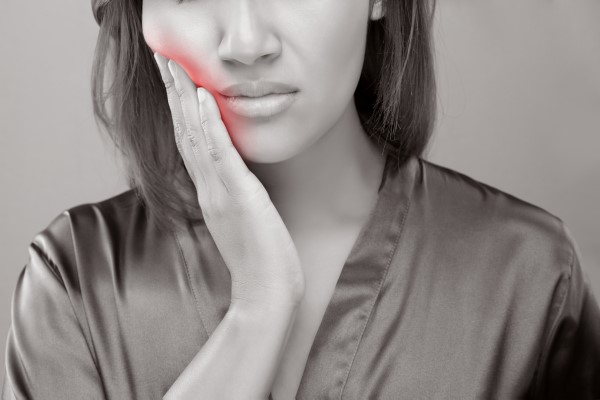TMJ, or temporomandibular joint disease, is a complex and often progressive disorder. Symptoms may include earaches, headaches, jaw noises, and even sensitive teeth. If left untreated, TMJ may eventually cause permanent damage to the jaw and its supporting structures. With early detection and treatment, however, TMJ can often be halted or even reversed.

Causes of TMJ
The temporomandibular joint acts as a sliding hinge between the jawbone and the skull. Cushioned by discs and cartilage, it normally glides smoothly. But when it becomes misaligned, TMJ is often the result.
The root cause of the misalignment varies between individual sufferers. Hormonal fluctuations, stress, anxiety, and jaw trauma are sometimes implicated. But for many people, the cause is unclear. What is known is that in people with TMJ, this misalignment causes the forces of chewing to pull the jaw out of joint, putting pressure on the entire region and causing pain and popping sounds.
TMJ Symptoms
No two people’s experiences with TMJ are exactly alike, making it tough to diagnose the disorder based on symptoms. However, there are certain hallmarks that indicate the need for a careful TMJ examination:
Popping, clicking, or grating sounds from the jaw
Difficulty fully opening or closing the mouth due to jaw lockup
Earaches
Headaches
Jaw pain
Chewing difficulties
Generalized facial pain
Treating TMJ
Because everyone experiences TMJ in a different way, successful treatment must be customized to the individual patient. The goal for treatment is to realign the bite while relaxing the jaw. Common treatments include:
Medication
Orthotic or bite splint
Physical therapy
Functional reconstruction
Other specialized treatments
After a thorough examination, your dentist will work with you to craft an individualized treatment plan. Expect to participate in multiple visits, especially if the underlying issues are complex. Your dentist will explain what to expect every step of the way.
Home Remedies
Those with very mild TMJ may discover that home remedies are sufficient on their own. For the bulk of TMJ sufferers, though, home treatments will be combined with in-office procedures. Home care suggestions include, but are not limited to:
Soft diet during healing, gradually introducing harder to chew foods
Ice packs
Over the counter medications
Restrictions on chewing gum or ice
Intentional jaw relaxation exercises
TMJ is highly individualized, and what works for one person may be completely wrong for another. If you have symptoms of TMJ, see your dentist for proper diagnosis and treatment planning. As TMJ tends to worsen over time, and could eventually cause irreversible damage, it is important to begin a personalized treatment regimen as soon as possible. With early diagnosis and proper treatment, there is no reason to suffer with the pain of TMJ.
Conveniently located in Woodbury, MN, Creekview Dental provides a progressive yet conservative approach to dental care. Our innovative, highly personalized procedures are focused on maintaining tooth structure and providing you with the healthy, beautiful smile you deserve. Call us today at 651-738-8204 to take the first steps on the road to better dental health.
